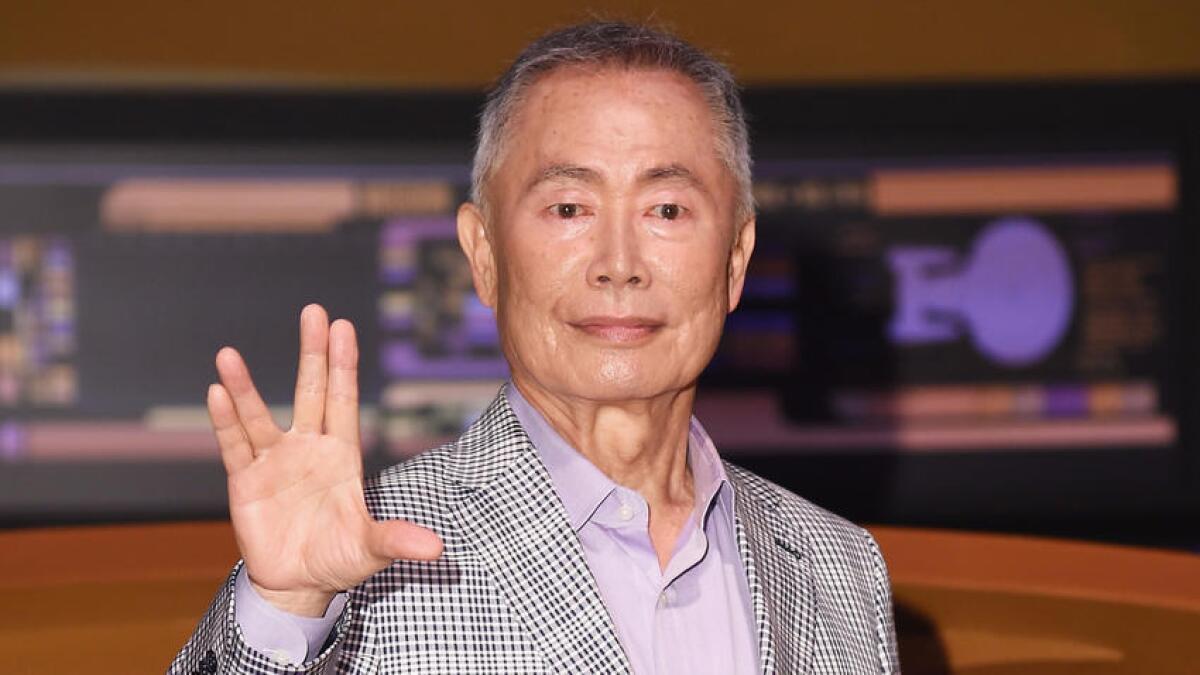How George Takei’s East L.A. boyhood made him take on Donald Trump — in Spanish

- Share via
The face is familiar, as is the baritone voice. Then he starts speaking.
“Cuando era nino pequeno, los politicos…”
“When I was a little boy, politicians used fear and racism against people of Japanese descent in this country.”
With these words, the actor and sometime activist George Takei compares the internment of Japanese Americans in World War II to “las palabras y los planes” — the word and plans — of Donald Trump. Takei posted the four-minute video on his Facebook page July 20 and it’s already been viewed nearly 12 million times.
He’s certainly not first celebrity to use some star power to advance a cause. But in an interview, the actor best known as Mr. Sulu from “Star Trek,” explained how he drew upon his family’s experiences in East Los Angeles — and in an internment camp — to make the video.
Takei dedicated the video to his “Latino fans and their families and friends” and compares Trump’s campaign speeches to a darker period in American politics.
“When I heard Donald Trump talk about immigrants from south of the border and Muslims, it was chilling to me,” he said in the interview. “It’s precisely the kind of language my parents heard. I was 5 years old when American soldiers with bayonets on their rifles came to our driveway and ordered us out of our home.”
See the most-read stories this hour »
But why record the video in Spanish?
Takei grew up in a Mexican American neighborhood in Boyle Heights, where he learned to speak the language fluently. He said his mother’s best friend in the neighborhood was of Mexican descent — and in the video recalls his mother’s tears “as we took with us only what we could carry, and lost all we had worked so hard for.”
Takei’s family was interned for four years.
Takei also draws parallels between wartime and today. “They said we were all spies and saboteurs, that none of us could be trusted,” he says in the video. “When Trump says today that Mexicans are rapists and drug dealers, it is his way of similarly dehumanizing whole groups, so that he can set his plans in motion.”
The video intersperses images of Takei with black-and-white photographs of Japanese Americans headed off to the camps, carrying possessions or luggage, or behind barbed wire. There also are images of politicians of the era, such as President Franklin D. Roosevelt, who ordered the internment in 1942, not long after the bombing of Pearl Harbor on Dec. 7, 1941.
Takei has spoken out frequently for liberal causes. “I’m a Hillary supporter. I wanted to say to those who aren’t registered, to register to vote,” he said.
NEWSLETTER: Get the day’s top headlines from Times Editor Davan Maharaj »
Polls show Latinos have overwhelmingly negative opinions about Trump, and Takei notes their potential role in key states in the November election.
“Latinos have the power to stop Trump, especially by voting in large numbers in swing states like Nevada, Colorado and New Mexico,” he says in the video. “Your numbers can even put states like Arizona and Texas into contention.”
Adrian Pantoja, a senior analyst for Latino Decisions, a firm that provides data on Latino political opinions, said a video like Takei’s, made in Spanish and directed at Latinos, can cause what he called a “fusion effect.” The video carries English subtitles, widening its audience. As of Thursday it had been shared on Facebook 323,744 times.
“If you reach out to one individual of a multi-generational household, then that one member is going to reach out to others in the house and talk about the message they heard,” Pantoja said. Forty percent of Latino voters are millennials, according to Pantoja, while 60% of Latinos are bilingual.
English proficiency among Latinos has grown largely in the last 14 years, fueled by the rising number of Latino youths born in the United States. Among Latino millennials, 88% speak only English at home or speak English very well, according to 2014 data from the Census Bureau. That’s up from 73% in 2000.
Pantoja said Takei’s message would resonate with many minority groups.
“It’s not solely an experience of Japanese or Asians,” Pantoja said. “There are large numbers of communities and religious minorities that feel, at a particular moment in time, like a target. They’re not alone.”
Gabriel Sanchez, a partner at Latino Decisions, said 12 million views is significant viewership for a Spanish-language video.
“I’d say it has had high saturation, especially if it’s been online for a week,” he said. “The message of a video itself is probably the most important piece of the puzzle when it comes to reaching out to Latinos.”
The video has received 14,000 comments on Takei’s Facebook page. A few writers take him to task.
“Your story is sad, but you overcame it,” wrote Anthony Ekenstam. “But I think your missing the point about people being here illegally.” But then Ekenstam added that Takei is “a great actor.”
More common are comments like this one left by Joshua Perkins: “George, your story is one we need to keep hearing. We need reminders of the atrocities committed out of racism and fear to keep us from ever repeating those horrendous mistakes.”
Twitter: @alexiafedz
ALSO
Watch Muslim kids read letters from Japanese internment camp survivors
Tim Kaine: ‘For Donald Trump, Latinos are second-class citizens’






